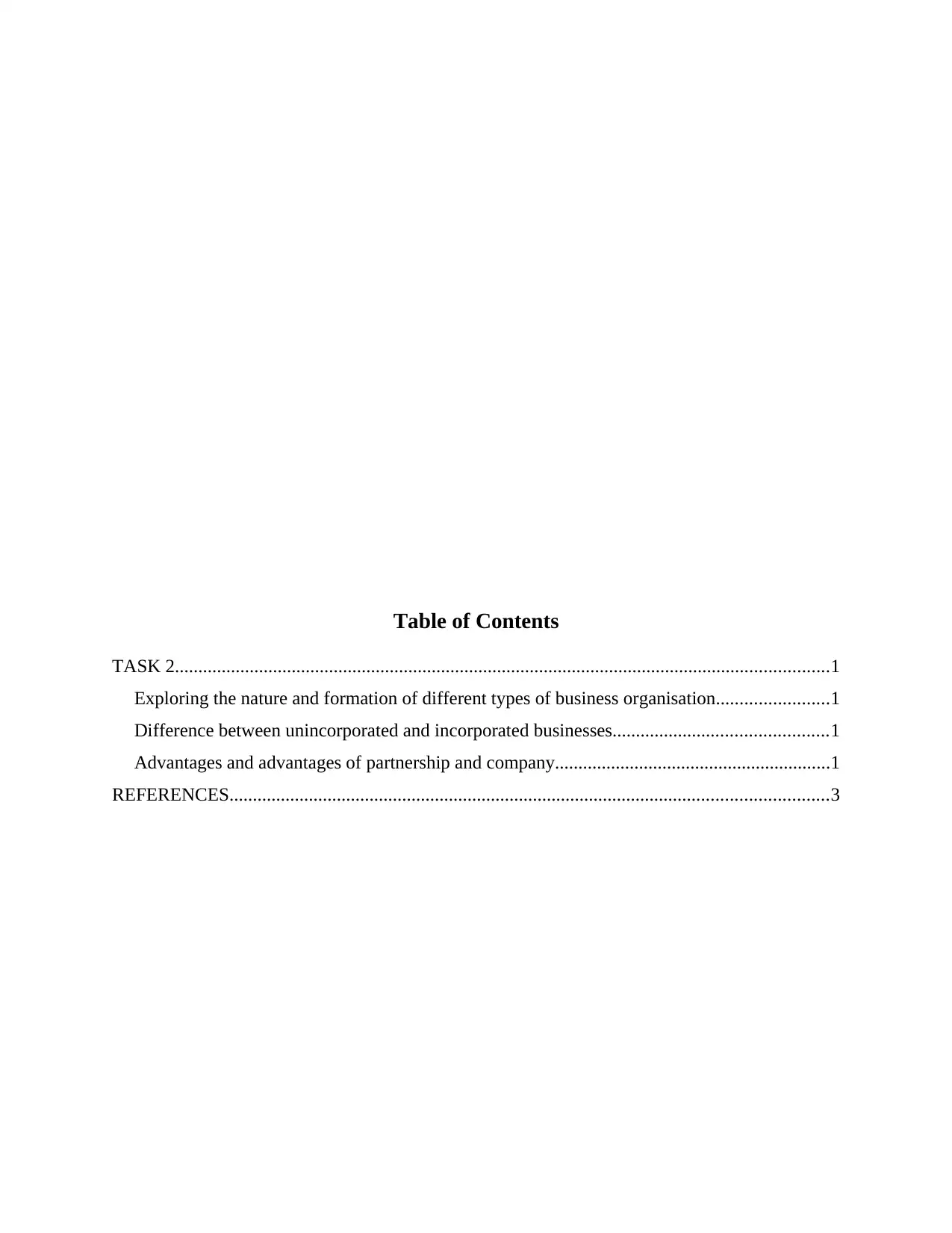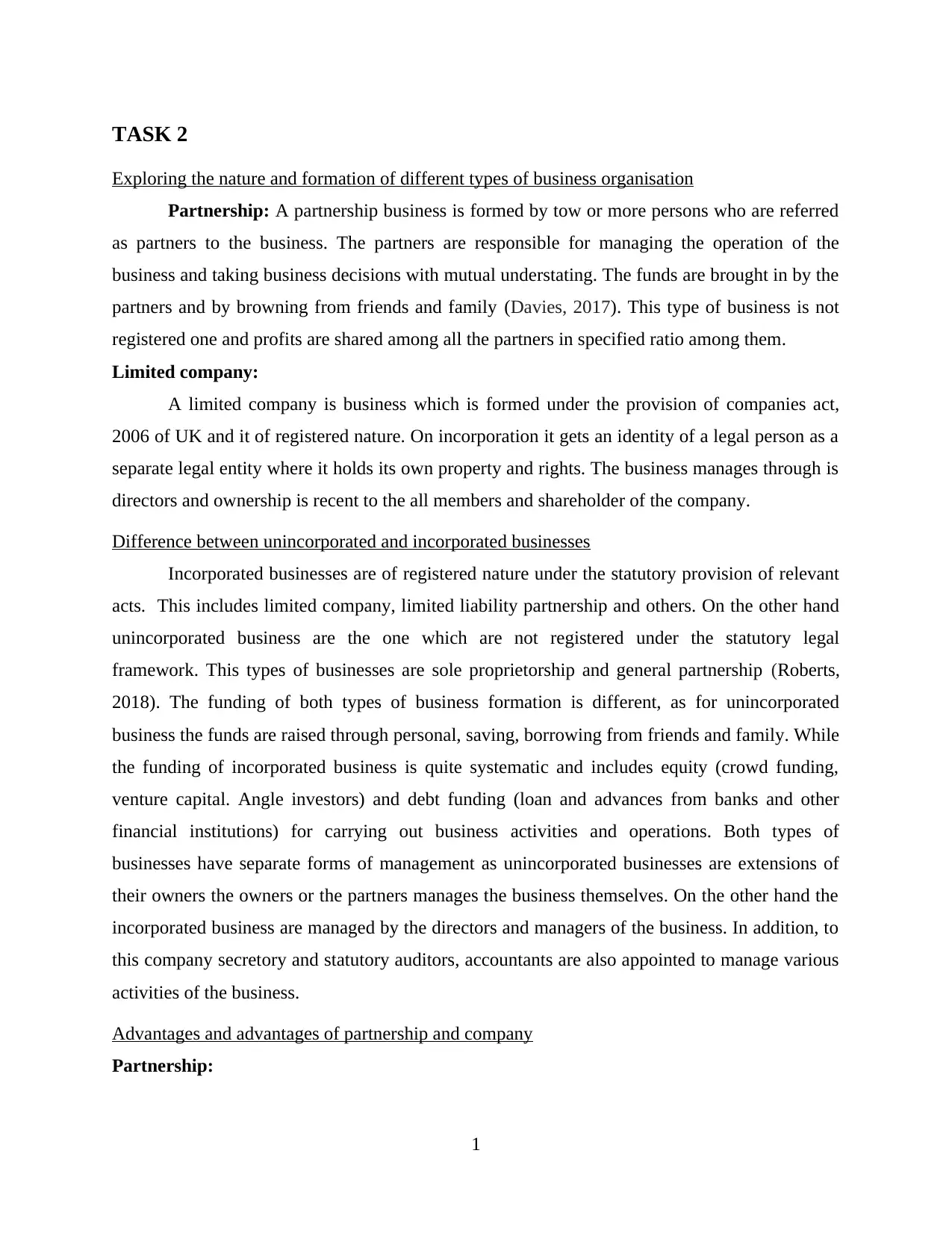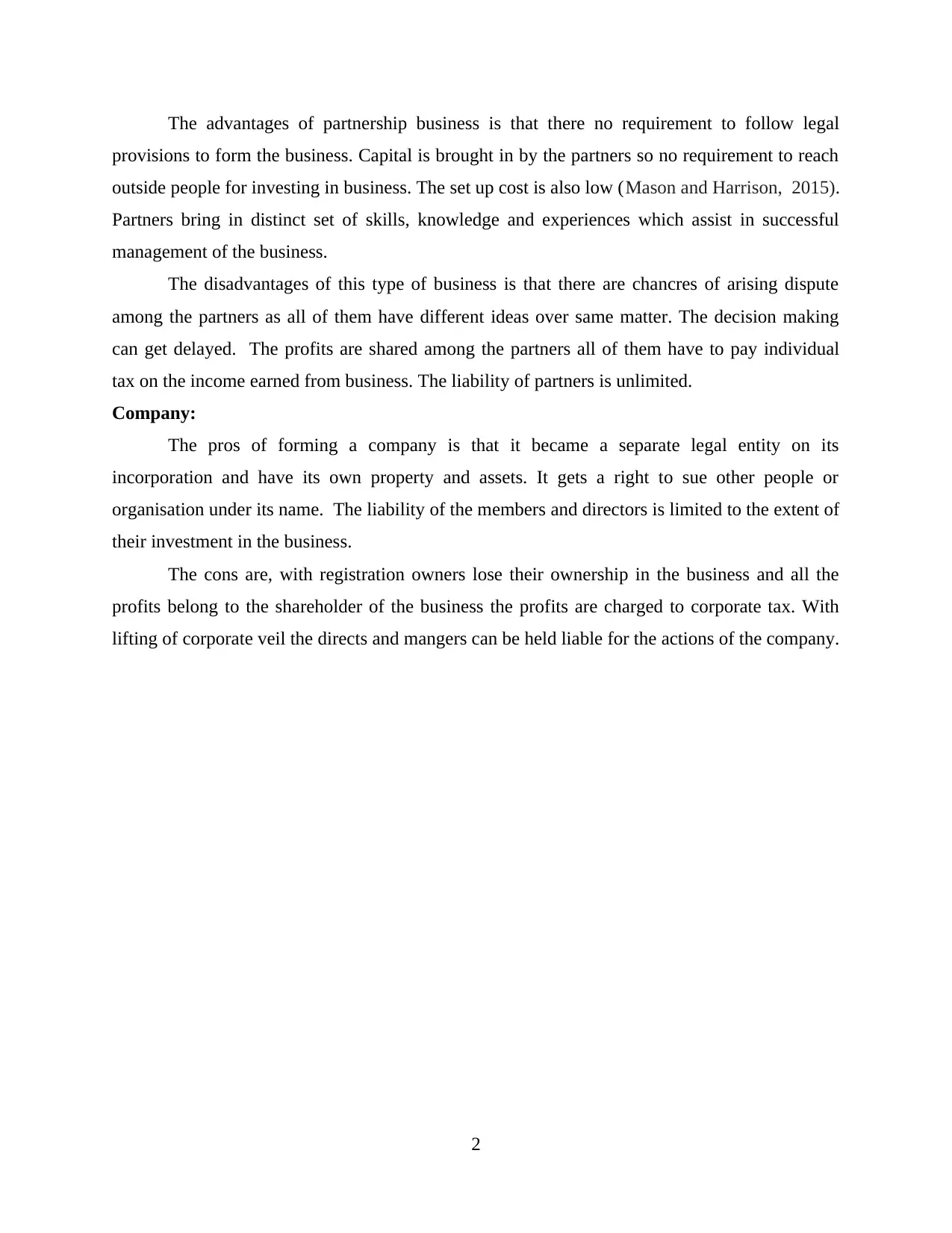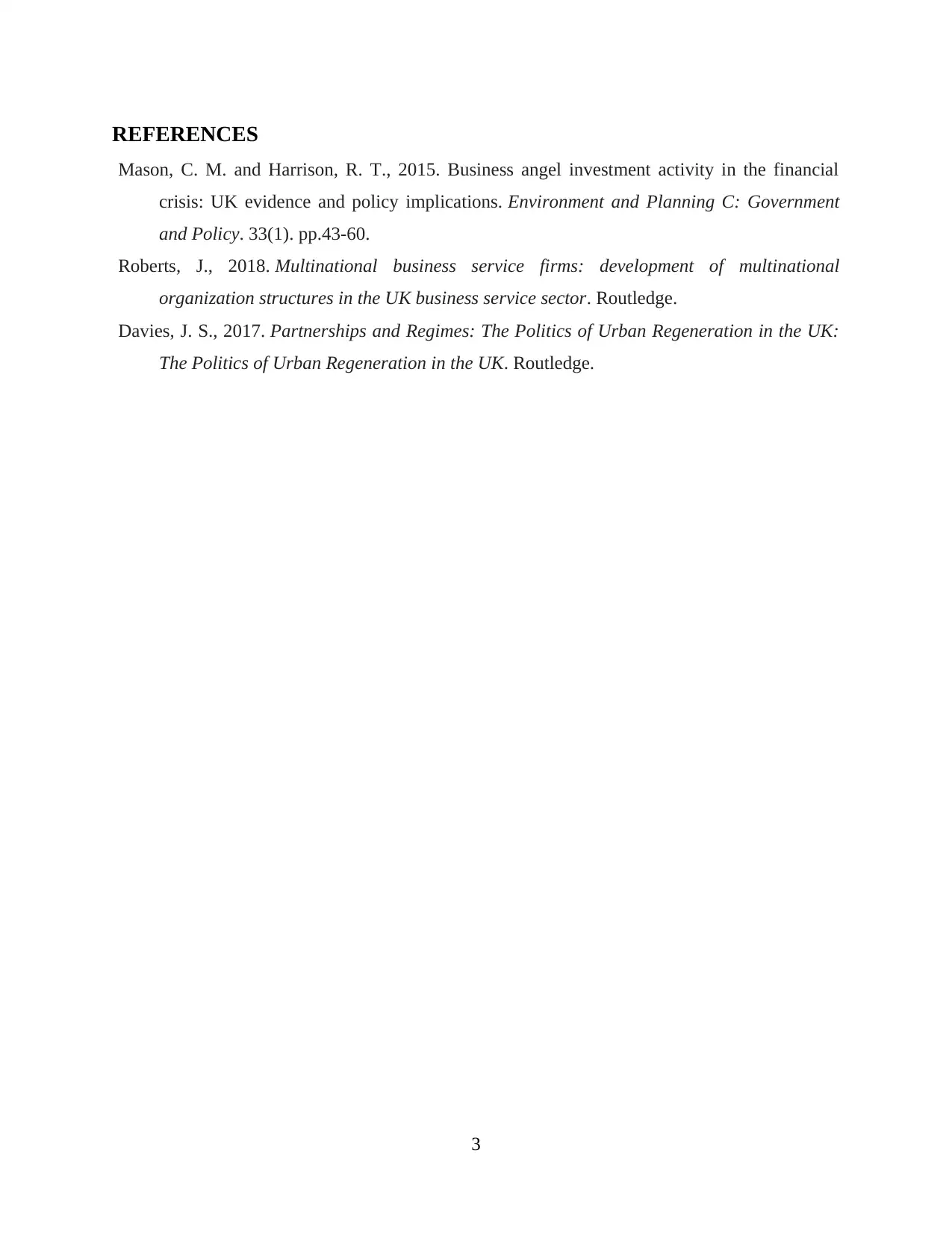Business Law: Analysis of Business Structures and Formations
VerifiedAdded on 2020/11/23
|5
|773
|343
Report
AI Summary
This report delves into the realm of business law, specifically focusing on the nature and formation of different types of business organizations. It meticulously contrasts unincorporated and incorporated businesses, highlighting their key distinctions. The report further explores the advantages and disadvantages inherent in both partnerships and limited companies, providing a comprehensive analysis of their operational and legal characteristics. The discussion includes the funding mechanisms, management structures, and liability considerations associated with each business type. The report also references supporting literature to strengthen the analysis and provide a robust understanding of the subject matter.

Business law
Paraphrase This Document
Need a fresh take? Get an instant paraphrase of this document with our AI Paraphraser

Table of Contents
TASK 2............................................................................................................................................1
Exploring the nature and formation of different types of business organisation........................1
Difference between unincorporated and incorporated businesses..............................................1
Advantages and advantages of partnership and company...........................................................1
REFERENCES................................................................................................................................3
TASK 2............................................................................................................................................1
Exploring the nature and formation of different types of business organisation........................1
Difference between unincorporated and incorporated businesses..............................................1
Advantages and advantages of partnership and company...........................................................1
REFERENCES................................................................................................................................3

TASK 2
Exploring the nature and formation of different types of business organisation
Partnership: A partnership business is formed by tow or more persons who are referred
as partners to the business. The partners are responsible for managing the operation of the
business and taking business decisions with mutual understating. The funds are brought in by the
partners and by browning from friends and family (Davies, 2017). This type of business is not
registered one and profits are shared among all the partners in specified ratio among them.
Limited company:
A limited company is business which is formed under the provision of companies act,
2006 of UK and it of registered nature. On incorporation it gets an identity of a legal person as a
separate legal entity where it holds its own property and rights. The business manages through is
directors and ownership is recent to the all members and shareholder of the company.
Difference between unincorporated and incorporated businesses
Incorporated businesses are of registered nature under the statutory provision of relevant
acts. This includes limited company, limited liability partnership and others. On the other hand
unincorporated business are the one which are not registered under the statutory legal
framework. This types of businesses are sole proprietorship and general partnership (Roberts,
2018). The funding of both types of business formation is different, as for unincorporated
business the funds are raised through personal, saving, borrowing from friends and family. While
the funding of incorporated business is quite systematic and includes equity (crowd funding,
venture capital. Angle investors) and debt funding (loan and advances from banks and other
financial institutions) for carrying out business activities and operations. Both types of
businesses have separate forms of management as unincorporated businesses are extensions of
their owners the owners or the partners manages the business themselves. On the other hand the
incorporated business are managed by the directors and managers of the business. In addition, to
this company secretory and statutory auditors, accountants are also appointed to manage various
activities of the business.
Advantages and advantages of partnership and company
Partnership:
1
Exploring the nature and formation of different types of business organisation
Partnership: A partnership business is formed by tow or more persons who are referred
as partners to the business. The partners are responsible for managing the operation of the
business and taking business decisions with mutual understating. The funds are brought in by the
partners and by browning from friends and family (Davies, 2017). This type of business is not
registered one and profits are shared among all the partners in specified ratio among them.
Limited company:
A limited company is business which is formed under the provision of companies act,
2006 of UK and it of registered nature. On incorporation it gets an identity of a legal person as a
separate legal entity where it holds its own property and rights. The business manages through is
directors and ownership is recent to the all members and shareholder of the company.
Difference between unincorporated and incorporated businesses
Incorporated businesses are of registered nature under the statutory provision of relevant
acts. This includes limited company, limited liability partnership and others. On the other hand
unincorporated business are the one which are not registered under the statutory legal
framework. This types of businesses are sole proprietorship and general partnership (Roberts,
2018). The funding of both types of business formation is different, as for unincorporated
business the funds are raised through personal, saving, borrowing from friends and family. While
the funding of incorporated business is quite systematic and includes equity (crowd funding,
venture capital. Angle investors) and debt funding (loan and advances from banks and other
financial institutions) for carrying out business activities and operations. Both types of
businesses have separate forms of management as unincorporated businesses are extensions of
their owners the owners or the partners manages the business themselves. On the other hand the
incorporated business are managed by the directors and managers of the business. In addition, to
this company secretory and statutory auditors, accountants are also appointed to manage various
activities of the business.
Advantages and advantages of partnership and company
Partnership:
1
⊘ This is a preview!⊘
Do you want full access?
Subscribe today to unlock all pages.

Trusted by 1+ million students worldwide

The advantages of partnership business is that there no requirement to follow legal
provisions to form the business. Capital is brought in by the partners so no requirement to reach
outside people for investing in business. The set up cost is also low (Mason and Harrison, 2015).
Partners bring in distinct set of skills, knowledge and experiences which assist in successful
management of the business.
The disadvantages of this type of business is that there are chancres of arising dispute
among the partners as all of them have different ideas over same matter. The decision making
can get delayed. The profits are shared among the partners all of them have to pay individual
tax on the income earned from business. The liability of partners is unlimited.
Company:
The pros of forming a company is that it became a separate legal entity on its
incorporation and have its own property and assets. It gets a right to sue other people or
organisation under its name. The liability of the members and directors is limited to the extent of
their investment in the business.
The cons are, with registration owners lose their ownership in the business and all the
profits belong to the shareholder of the business the profits are charged to corporate tax. With
lifting of corporate veil the directs and mangers can be held liable for the actions of the company.
2
provisions to form the business. Capital is brought in by the partners so no requirement to reach
outside people for investing in business. The set up cost is also low (Mason and Harrison, 2015).
Partners bring in distinct set of skills, knowledge and experiences which assist in successful
management of the business.
The disadvantages of this type of business is that there are chancres of arising dispute
among the partners as all of them have different ideas over same matter. The decision making
can get delayed. The profits are shared among the partners all of them have to pay individual
tax on the income earned from business. The liability of partners is unlimited.
Company:
The pros of forming a company is that it became a separate legal entity on its
incorporation and have its own property and assets. It gets a right to sue other people or
organisation under its name. The liability of the members and directors is limited to the extent of
their investment in the business.
The cons are, with registration owners lose their ownership in the business and all the
profits belong to the shareholder of the business the profits are charged to corporate tax. With
lifting of corporate veil the directs and mangers can be held liable for the actions of the company.
2
Paraphrase This Document
Need a fresh take? Get an instant paraphrase of this document with our AI Paraphraser

REFERENCES
Mason, C. M. and Harrison, R. T., 2015. Business angel investment activity in the financial
crisis: UK evidence and policy implications. Environment and Planning C: Government
and Policy. 33(1). pp.43-60.
Roberts, J., 2018. Multinational business service firms: development of multinational
organization structures in the UK business service sector. Routledge.
Davies, J. S., 2017. Partnerships and Regimes: The Politics of Urban Regeneration in the UK:
The Politics of Urban Regeneration in the UK. Routledge.
3
Mason, C. M. and Harrison, R. T., 2015. Business angel investment activity in the financial
crisis: UK evidence and policy implications. Environment and Planning C: Government
and Policy. 33(1). pp.43-60.
Roberts, J., 2018. Multinational business service firms: development of multinational
organization structures in the UK business service sector. Routledge.
Davies, J. S., 2017. Partnerships and Regimes: The Politics of Urban Regeneration in the UK:
The Politics of Urban Regeneration in the UK. Routledge.
3
1 out of 5
Related Documents
Your All-in-One AI-Powered Toolkit for Academic Success.
+13062052269
info@desklib.com
Available 24*7 on WhatsApp / Email
![[object Object]](/_next/static/media/star-bottom.7253800d.svg)
Unlock your academic potential
Copyright © 2020–2026 A2Z Services. All Rights Reserved. Developed and managed by ZUCOL.





